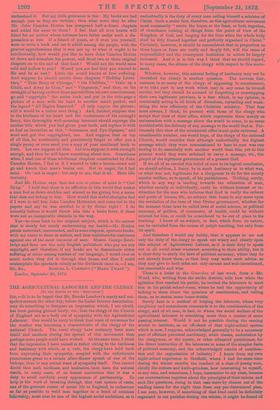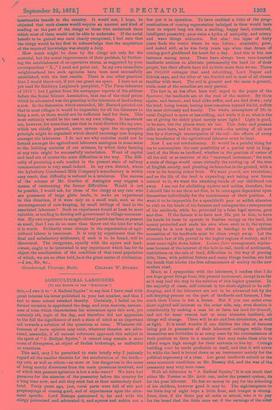THE AGRICULTURAL LABOURER AND THE CLERGY. [TO THE EDITOR OF
THE "SPECTATOR.") SIR,—It is to be hoped that Mr. Brooke Lambert's manly and out- spoken sermon the other day, before the Social Science Association, may do something to dissipate an impression which, I am afraid, has been gaining ground lately, viz., that the clergy of the Church of England are as a body out of sympathy with the Agricultural Labourer. One would be sorry to think that want of reverence for the weaker was becoming a characteristic of the clergy of the national Church. The rural clergy have certainly been more timid and cautious during the spread of this movement than perhaps some people could have wished. At the same time, I think that the impression I have named is rather owing to the tardiness and hesitancy with which, as a rule, the clergy have held back from expressing their sympathy, coupled with the unfortunate prominence given to a certain after-dinner speech of one of the bishops, than to any actual want of sympathy itself. One cannot doubt that such tardiness and hesitation have been the natural result, in many cases, of an honest conviction that it was a duty to avoid carefully every appearance of partisanship. To help in the work of breaking through that vast system of caste, one of the greatest curses of social life in England, to endeavour as far as possible to weld men together in a bond of common fellowship, must ever be one of the highest social ambitions, as it I undoubtedly is the duty of every man calling himself a minister of Christ. Such a social fact, therefore, as this agricultural movement.
must necessarily " excite the hopes or the fears, or both together, of churchmen looking at things from the point of view of the Kingdom of God, and longing for the time when the whole body shall be fitly framed together and perfectly organised in Christ."
Certainly, however, it should be remembered that in proportion as those hopes or fears are really and deeply felt, will the sense of responsibility and the consequent hesitation in action be largely increased. And it is in this way I think that we should regard,. in many cases, the silence of the clergy with respect to this move- ment.
Whether, however, this natural feeling of hesitancy may not be cherished too closely is another question. The nervous fear, common to so many of the clergy, of appearing to countenance,. or to take part in any work which may in any sense be termed secular, lest they should be accused of forgetting or overstepping their own legitimate province, is a fear which, in my opinion, is- continually acting in all kinds of directions, curtailing and weak- ening the true efficiency of the Christian ministry. That fear must always, I think, be present with those of the clergy who. accept that view of their office, which represents them merely as ambassadors with a message about the world to come, in no sense- troubled with the delivery of any message to the world that is. For- tunately this view of the ministerial office is not quite universal. A considerable number, one would hope, of the clergy of the national' Church, would consider that although undoubtedly the highest message which they were commissioned to bear to men was one having to do essentially with another world than this, yet to this. present world they were ordained to carry a message, viz., the gospel of the righteous government of a present God.
If we all of us carried this belief of ours to its logical conclusion,. we should seldom, 1 fancy, be in much hesitancy as to what was, or what was not, legitimate for a clergyman to do for the merely secular welfare, so to speak, of his parishioners. Nothing, surely, which in any way is tending towards the education of men, whether socially or individually, could be without interest or in- struction for the man who believes that God is really the orderer and guide of human life, no subject that bears in any sense upon the revelation of the laws of that Divine government, whether for the moment those laws be called laws of social science, or political economy, of politics, of commerce, of health, could be without interest for him, or could be considered to be out of place in his teaching. I know of no subject, in fact, which from its nature, can be excluded from the course of pulpit teaching, but only from its spirit.
And therefore I would say boldly, that it appears to me not only the duty of the clergy to speak out wisely and clearly upon- this subject of Agricultural Labour, as it is their duty to speak out in all social crises whatever, according to their ability, but it is their duty to study the laws of political economy, where they do• not already know them, so that they may make such advice as. they may give to both sides not only earnest and well-intentioned, but reasonable and wise.
There is a letter in the Guardian of last week, from a Mr._ Wood, who, writing from the strike district, tells how when the- agitation first reached his parish, he invited the labourers to meet. him in his parish school-room, where he had the opportunity of talking to them about the question of combination, and telling them, as he states, some home-truths.
Surely here is a method of helping the labourer, whose very simplicity and naturalness commends it to the consideration of the- clergy, and of all men, in fact, to whom the social welfare of the agricultural labourer is something more than a matter of mere passing interest. Would it not be possible during the coming winter to institute, as an off-shoot of that night-school system which is now, I suppose, acknowledged generally to be a necessary part of efficient parochial machinery, adult classes, undertaken by the clergyman, or the squire, or other educated parishioner, for- the direct instruction of the labourers in some of the simpler facts- of political economy, and the acknowledged results of combina- tion and the organisation of industry ? I know from my own night-school experience in Sheffield, where I had for some time during the winter months the conduct of a class of young men, chiefly file-cutters and knife-grinders, how interesting to myself, at any rate, and sometimes, I hope, instructive to my class, became our conversations together about the principles of their unions, and such like questions, rising in that case more by chance out of the- reading lesson for the night than from any pre-determined plan.. I am sure, however, if something of that kind could be definitely organised in our parishes during the winter, it might be found of
inestimable benefit to the country. It would not, I hope, be objected that such classes would require an amount and kind of reading on the part of the clergy or those who undertook them which most of them would not be able to undertake. If the social benefit to be gained was once clearly recognised, I feel sure that the clergy would be the first to acknowledge that the acquisition of the required knowledge was simply a duty.
How much might be done by the clergy not only for the material, but the moral improvement of their parishes, by further- ing the establishment of co-operative stores, as suggested by your correspondent " X.," I need not point out. In my own immediate neighbourhood two such agencies have been most successfully established, with the best results. There is one other practical hint I would throw out, if you can grant me space. I have not as -yet read Sir Baldwyn Leighton's pamphlet, "The Farm-labourers of 1872 "; but I gather from the newspaper reports of his address before the Social Science Association, that one of the chief points which he advocated was the granting to the labourers of land to keep -a cow. In the discussion which succeeded, Mr. Bastard pointed out that in most villages it would be impossible for all the labourers to keep a cow, as there would not be sufficient land for them. This most certainly would be the case in my own village. It has struck me, however, for some time past that in rural districts like my own, which are chiefly pastoral, some system upon the co-operative principle might be organised which should encourage cow-keeping amongst the labourers. I do not see why societies could not be formed amongst the agricultural labourers analogous in some sense to the building societies of our artisans, by which dairy farming at any rate might be successfully undertaken. Want of capital and land are of course the main difficulties in the way. The diffi- culty of procuring a safe market in the present state of railway communication is very small indeed. In my own district, where the Aylesbury Condensed Milk Company's manufactory is within easy reach, that difficulty is reduced to a minimum. The success of the scheme of Mr. Gurdon of Assington may suggest a means of overcoming the former difficulties. Would it not be possible, I would ask, for those of the clergy at any rate who are possessors of large glebe lands, to make an experiment in this direction, if it were only on a small scale, such as the encouragement of cow-keeping, by small lettings of land to the associated labourers? Such an experiment would at least be most valuable, as tending to develop self-government in village communi- ties. My own experience in an agricultural parish has been at present so small, that I can do no more than throw out the hint for what it is worth. Evidently some change in the organisation of agri- cultural labour is imminent. It is only by experiment that the final and satisfactory settlement, if such is to be found, will be discovered. The clergyman, equally with the squire and land- owner, ought to be interested in any experiment which has for its object the amelioration of the condition of that rural population of which, we are so often told, he is the great centre of civilisation. —I am, Sir, &c.,



































 Previous page
Previous page